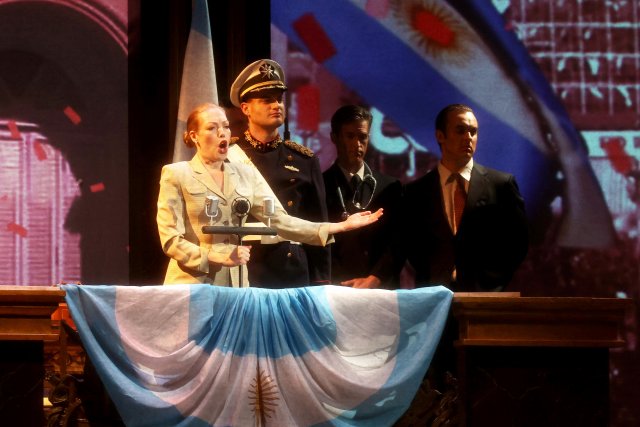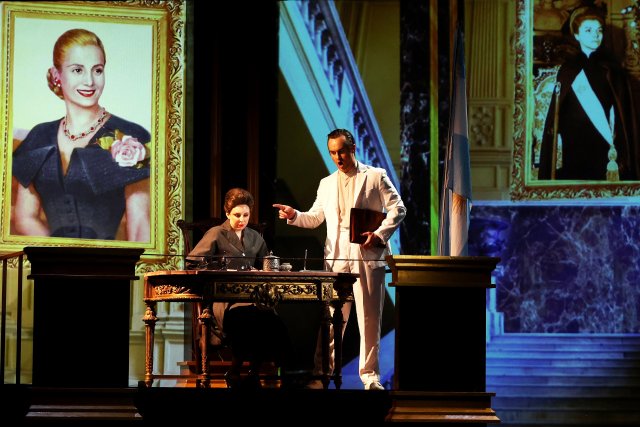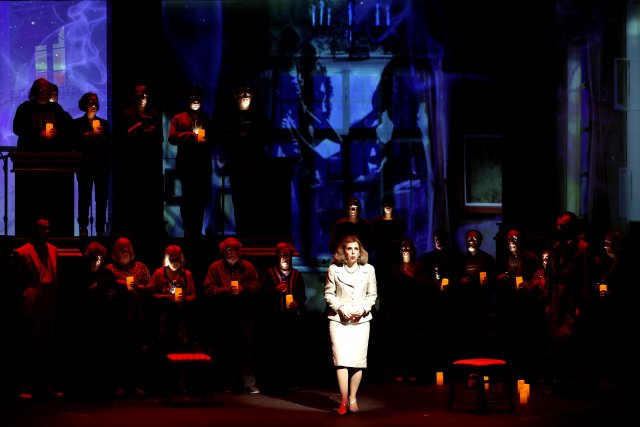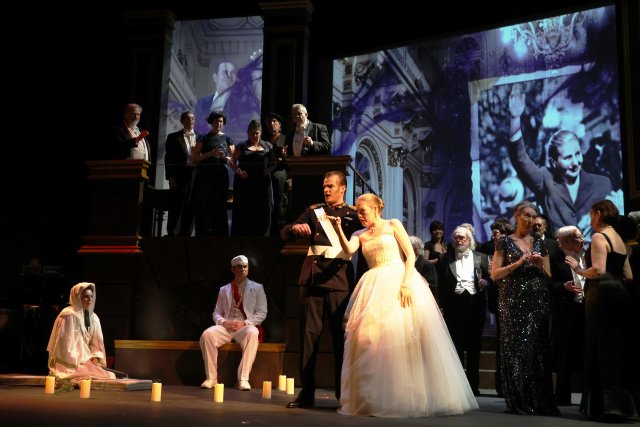Corpus Evita
West Bay Opera Performs 2006 Grammy Nominee
By: Victor Cordell - Feb 17, 2024
The name Perón is synonymous with modern politics in Argentina. Juan Perón was a dominant post-WW2 populist president. His second wife Evita became a mystical talisman for the country’s working class seeking a better way of life, but she died tragically in 1952 at age 33. Perón was overthrown in 1955, but returning from exile, his third wife, Isabel, became his running mate in 1973 and succeeded him upon his death. She sought to resurrect the magnetic aura of Evita as her own, only to be repudiated and overthrown by a military coup in 1976.
In fashioning “Corpus Evita,” composer Carlos Franzetti and librettist José Luis Moskovich explore the charisma of Juan and Evita, in contrast with Isabel’s doomed ascent and rejection, replete with the apparitions of her predecessors. The seldom produced but remarkable musical drama was nominated for a Grammy in 2005.
West Bay Opera offers a musically and visually powerful rendering of this piece which holds special resonance for its creators. Both composer and librettist grew up in Argentina in the Perón era; were teenagers during Isabel’s regime; and ultimately crafted this operatic indictment of Perónism that many in their home country would find objectionable. The librettist is West Bay’s General Manager, its artistic visionary, and the conductor of the orchestra.
The vivid look of the opera from Peter Crompton’s set and projection design appears from the start, with a classic public-appearances balcony surrounded by expressive and detailed projections that give depth to the stage. At the opening, Evita bids farewell to her admirers from the balcony as she is dying from cancer. In her soliloquy, soprano Jessica Sandidge cuts a striking and authentic figure as she powers through the high passages with grace and authority.
The scene then shifts to 1974. The central focus throughout the narrative is on the unprepared and hapless Isabel who considers herself well-intended but is unable to offer the hope and magnetism of Evita. Feeling ineffectual and trapped, she meekly authorizes actions that result in the murders of thousands of innocent people. Soprano Sara LeMesh adeptly captures Isabel’s inner conflict and sings her anguish with strident conviction without losing her eloquent vibrato.
A composite figure, Ministro, is the male lead, performed by tenor Patrick Bessenbacher. He poses an ominous figure as the behind-the-scenes manipulator who hopes to resurrect “the flame of Evita” through Isabel. He scorches his rage through his mid and upper range, but is asked to dig lower at times, and gets lost beneath the orchestra.
The musical idiom of the piece is neoromantic, without memorable melodies but continuously attractive. Lush strings-forward sound dominates, with percussion often finishing, especially in heated sequences. Notable choral contributions also include rhythmic, percussive effects, especially through repetition like “Evita. Evita. Evita” or “Isabel. Isabel. Isabel.”
Ensemble pieces also appeal. Evita and Juan, sung by bass Casey Germain, engage in a self-indulgent duet at a grand ball, and the contrast of voices works particularly well. Conversely, Isabel and Ministro vocally shout blame at each other with controlled fury in their electric exchange. In a revelatory trio, Isabel, Juan, and Ministro share their different perspectives and shared regrets from Isabel’s failed regime.
“Corpus Evita” deals intelligently with important themes. And though the conceit of magical realism allows for great leeway, because this opera deals with critical historical issues, accuracy is important. Greater clarity would be welcomed in the plot line. Simply including dates (which are in the program) in the supertitles would help orient the patron, as the timeline jumps by decades and is not chronological. And though the device of Evita as an apparition is clever and understandable, a scene that includes Isabel with both Evita and Corpus Evita is not clear.
The events depicted in the opera are highly dramatic and engaging. However, the drama is disrupted by emptiness during slow scene changes. If the set change can’t be hastened, one solution is to move transitional action in front of the curtain while props are being moved. Another is to add bridge orchestration for the changes.
Nonetheless, this opera offers a scintillating and worthy experience with beautiful music, an important storyline, and an opulent production. Thematically, it excoriates Perónism as a symbol of populism, decrying the cult of personality and myths that invariably lead to tyranny. Regrettably, many people fall captive to auras and neglect substance. We face the same chilling challenge in this country today.
“Corpus Evita” with music by Carlos Franzetti and lyrics by José Luis Moskovich is produced by West Bay Opera and plays at Lucie Stern Theatre, 1305 Middlefield Road, Palo Alto, CA through February 25, 2024.






